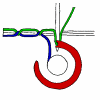To date, most inherited cases of breast cancer have been associated with two genes: BRCA1, which stands for BReast CAncer gene one, and BRCA2, or BReast CAncer gene two. The function of these genes is to keep breast cells growing normally and to prevent any cancer cell growth. But when these genes contain abnormalities, or mutations, they are associated with an increased breast cancer risk. Abnormal BRCA1 and BRCA2 genes may account for up to 10% of all breast cancers.Women diagnosed with breast cancer who have an abnormal BRCA1 or BRCA2 gene often have a family history of breast cancer, ovarian cancer, or both. But it's also important to remember that most women with breast cancer have no family history of the disease. Identifying BRCA1 and BRCA2 has led to new techniques for lowering, detecting, and treating breast cancer and lowering the risk for the disease. For women who wish to be tested, they can now establish whether the two genes are normal or not.But there's still a lot more to learn about these genes. And other genes probably also play a role in the development of breast cancer, for women both with and without a family history of the disease.
 The medical expert for Breast Cancer and Genetics Lovice Mæhle from Radiumhospitalet in Oslo. I visited her for a genetic risk assessment last summer. I and my family members needed information about breast cancer and breast cancer risk. I prepared a family tree which listed members of each generation of my biological family, with all available health and disease information. Ideally, this family tree should go back at least three generations and should include the type of cancer each relative has had, as well as the person's age at diagnosis.
The medical expert for Breast Cancer and Genetics Lovice Mæhle from Radiumhospitalet in Oslo. I visited her for a genetic risk assessment last summer. I and my family members needed information about breast cancer and breast cancer risk. I prepared a family tree which listed members of each generation of my biological family, with all available health and disease information. Ideally, this family tree should go back at least three generations and should include the type of cancer each relative has had, as well as the person's age at diagnosis. I'm a pink lady, so I had to wear something pink today.
I'm a pink lady, so I had to wear something pink today.  I got interviewed about why I decided to get a genetic risk assessment last summer. The Norwegian Public Health Department of the Ministry of Social Affairs is planning statutory rules for genetic risk assessments and they are not sure about who they will offer this assessment to......
I got interviewed about why I decided to get a genetic risk assessment last summer. The Norwegian Public Health Department of the Ministry of Social Affairs is planning statutory rules for genetic risk assessments and they are not sure about who they will offer this assessment to......




















 Quilter Blogs & Store Search
Quilter Blogs & Store Search





















No comments:
Post a Comment